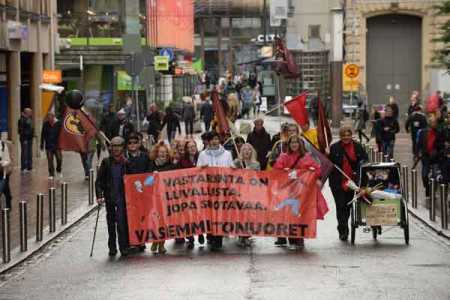|
Sun, 20 Sep, 2015 12:00:35 AM FTimes- Report, Sep 20  Photo Str-Lehtikuva. Left-wing parties could benefit from the government's wage reduction policy, something both sides of the social contract have ignored so far. According to researchers, however, the effects of escalating tensions on party support are still difficult to assess.
“This makes the opposition's work easier, as it is easy to debate and criticise,” says senior researcher Ville Pitkänen of the University of Turku's parliamentary research centre.
Professor of political science at the University of Tampere Tapio Raunio says that support for the opposition often increases during the first few months after a new government is elected.
At the moment, the Social Democratic Party (SDP) and the Left Alliance are benefiting from the government's course of action, where reforms are carried out without social partners. In addition, he believes the opposition benefits from the consequences of the government's actions, specifically the budget cuts.
According to a Gallup poll published this week in Helsingin Sanomat, SDP would receive 15 percent of the vote, up by 0.8 percent from the previous survey. The Left Alliance has also risen in popularity, receiving 7.8 percent of the vote.
The poll was primarily conducted before Prime MInister Juha Sipilä introduced pay cuts in his list of budget reductions.
From True Finns to the Left Alliance?
Support for the True Finns has been declining over the government's first few months in office. In addition to the Greek bailout package and immigration policy, the labour market situation has affected support for the True Finns, senior researcher Pitkänen believes.
"From Matti Putkonen's mouth, they advertised themselves as Finland's largest working-class party, but now [Labour Minister Jari] Lindstrom is making difficult decisions."
Both Pitkänen and Raunio believe that, due to the labour market situation, the SDP have a good chance to take votes back from the True Finns.
“The True Finns criticize the trade union movement, even though a significant portion of the electorate belong to a trade union,” says Raunio.
According to Raunio, the SDP and the Central Organisation of Finnish Trade Unions (SAK) have not approached each other, because either appearing to be an extension of the other is not good. SAK will also have to continue for many years with the present government, so it should not depend on SDP's support.
“SAK certainly hopes for a stronger left-wing, but not because of the wish to have a greater effect on the negotiations this autumn,” says Pitkänen.
More News
|
|
Finland Times
| Monday, 17 November, 2025 |

